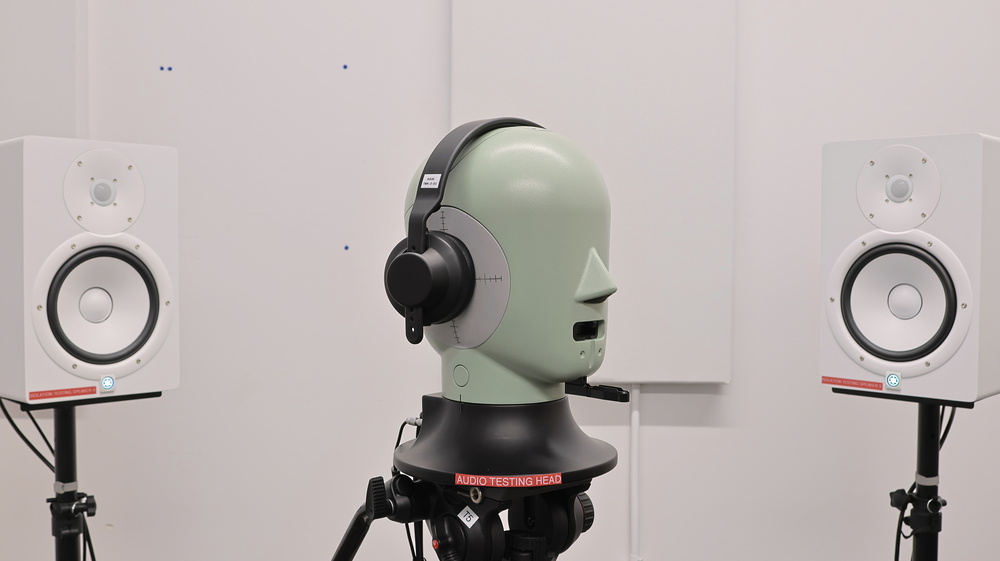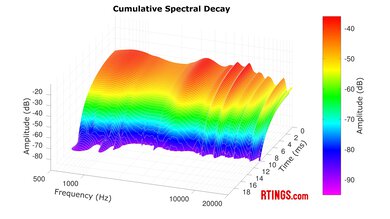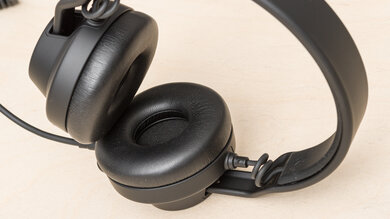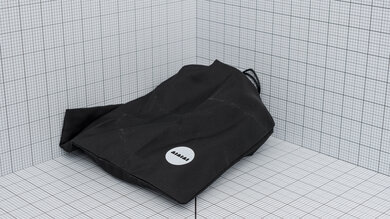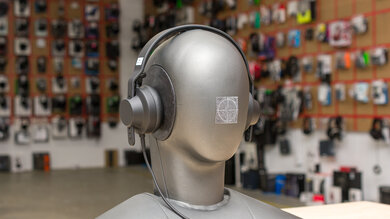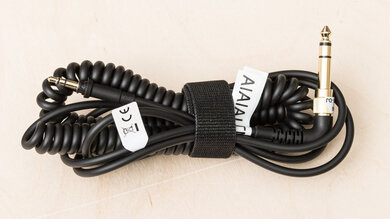AIAIAI has been around since 2010 and aims to do things a little differently than the big players by manufacturing modular headphones. The AIAIAI TMA-2 DJ is essentially an analog-only headphones kit that you assemble yourself, consisting of parts meant to work best for DJing. Most of the work has already been done by the factory, so what arrives simply requires sliding the drivers through the headband, plugging in the cables, and popping on the ear pads. You get the added bonus of possibly modifying them by swapping out components like the headband and drivers at additional costs. So, besides opening up the possibility of future upgrades, let's see how the headphones perform in this standard configuration.
Our Verdict
The AIAIAI TMA-2 DJ are inadequate for sports and fitness. While their relatively firm clamping force and on-ear design can appeal to folks who don't like wearing in-ears, their heavy cable pulls on one side and can catch on equipment. The absence of an IP rating and the lack of foldability in their design make them impractical at the gym. While you may favor the extra boost to the bass and mids to motivate your workout, they're best used for upright isometric exercises like bicep curls, rather than dynamic movements that can dislodge them.
-
Decent build quality.
-
Uncomfortable headband.
-
Can't fold down to a smaller size.
The AIAIAI TMA-2 DJ are sub-par for travel. As wired-only passive headphones, they lack active noise canceling or Bluetooth connectivity, which would lend them versatility. They're also not foldable, so they take up space in your bag. If you use them to watch in-flight movies, the sound profile emphasizes bass and low-mids, which can cause dialogue to sound a bit uneven and a little unclear. They're also decently comfortable, but the headband can catch on hair, and they're not amply padded, which can cause fatigue over extended trips.
-
Decent build quality.
-
Doesn't reduce low rumbling noise.
-
Uncomfortable headband.
-
Can't fold down to a smaller size.
The AIAIAI TMA-2 DJ are poor for office work. As passive isolating headphones, they don't cut out bothersome noises well across the audible frequency spectrum. They also lack a microphone, limiting their usefulness for online meetings and calls. Their headband doesn't feel very comfortable or luxurious to wear because it can catch on hair or feel a bit sticky if you're bald, though they're lightweight. Still, if you like warm and bass-forward sound signatures, you may like their tonal qualities.
-
Decent build quality.
-
Doesn't reduce low rumbling noise.
-
Uncomfortable headband.
-
No microphone included.
The AIAIAI TMA-2 DJ are a wired-only pair of headphones and can't be used wirelessly.
The AIAIAI TMA-2 DJ are middling for wired gaming. They lack a mic; if that's important, you can purchase a separate cable with an in-line and controls (which we've not tested). These are passive headphones that only connect via analog and don't have a USB wired mode or additional software to tweak. While they feel decently comfortable, they're not amply padded, and the silicone-lined headband can catch on hair. Their sound profile is quite warm and bassy, which can hinder the intelligibility of dialogue, and their sound varies depending on the wearer. The closed-back design doesn't doesn't lend sounds the range of depth of immersion that an angled reference speaker can.
-
Modular design allows you to switch out components.
-
Decent build quality.
-
Uncomfortable headband.
-
No microphone included.
-
Very veiled treble range.
The AIAIAI TMA-2 DJ are satisfactory for audio reproduction accuracy. Considering they're meant for DJing, their warm and bass-forward sound signature provides ample oomph, though this sound profile lacks detail in the high frequencies, limiting their versatility. Their drivers are well-matched for the most part, and group delay is tight across the audible frequency range. Their low harmonic distortion performance ensures your audio plays back cleanly. Still, the PRTF performance, like most on-ear closed-backs, indicates they don't interact with your ears' pinnas like angled reference speakers do. You can swap out parts, which means you can extend the lifespan or change the sound profile with new drivers, which is unique.
The AIAIAI TMA-2 DJ are poor for noise isolation, which is normal for passive headphones. They don't block low pitched noises like construction or ambient din. They dampen the sharpness of high-pitched noises like squealing brakes somewhat, though.
The AIAIAI TMA-2 DJ don't include a microphone. You can buy a separate cable with an in-line mic and controls, but we haven't tested this.
The AIAIAI TMA-2 DJ have unremarkable frequency response consistency. Due in part to the on-ear design, they sit a bit differently on everyone, regardless of their head size, hair length, or glasses. Although those different physical characteristics influence how you perceive the headphones' tuning, there's no winning combination, and they sound a bit different on everyone. That said, most people hear a slightly similar tuning but perceive it at different volumes.
- 5.8 Sports And Fitness
- 5.8 Travel
- 4.2 Office Work
- 3.5 Wireless Gaming (In Development)
- 5.5 Wired Gaming (In Development)
Performance Usages
- 7.3 Audio Reproduction Accuracy
- 4.8 Noise Isolation
- 0 Microphone (In Development)
- 6.0 Frequency Response Consistency
Changelog
-
Updated Apr 25, 2025:
This review has been updated to Test Bench 2.0, which adds the following tests: Stereo Mismatch, Group Delay, Cumulative Spectral Decay, PRTF, Harmonic Distortion, and Electrical Aspects. We've added new performance usages and updated the text throughout the Sound tests and side-by-sides.
- Updated Apr 25, 2025: We've converted this review to Test Bench 2.0, which updates our sound tests and adds performance usages. You can read more about this in our changelog.
-
Updated Oct 30, 2024:
The following test groups have been updated after Test Bench 1.8: Sound Profile, Raw Frequency Response, Bass Profile: Target Compliance, Mid-Range Profile: Target Compliance, Treble Profile: Target Compliance, and Peaks/Dips. Associated text changes have been made to match results from Test Bench 1.7 to Noise Isolation - Full Range and Noise Isolation - Common Scenarios. Text changes have also been made throughout the review to match these results.
- Updated Oct 28, 2024: We've converted this review to Test Bench 1.8, which updates our target curve and Sound tests. You can read more about this in our changelog.
- Updated Jul 30, 2024: We've converted this review to Test Bench 1.7, which updates our Noise Isolation test. We've also expanded the scope of this test to include Common Scenarios in addition to Voice Handling and Wind Handling.
Differences Between Sizes And Variants
The AIAIAI TMA-2 DJ arrive as a preset combination of modular parts in a kit that you assemble from the box. There's just one color: Black. For reference, the components for this set include 'S02' drivers, an 'H02' headband, 'E01' ear pads, and a 'C02' coiled cable. You can see the label for our unit here.
If you encounter another variant of this headset, please let us know in the comments, and we'll update our review.
Compared To Other Headphones
The first difference between the AIAIAI TMA-2 DJ and most headphones is their modular design. You can change the part most responsible for the sound profile, the drivers, which is very unusual. With that said, the AIAIAI TMA-2 DJ are bass-dominant. Another of the company's cans, the TMA-2 DJ XE, use interchangeable parts, too, with drivers meant to sound more analytical. The AIAIAI TMA-2 aren't billed as specifically environmentally friendly, but their swappable parts inherently extend the lifespan of these headphones to everyone regardless of technical skill, similar to eco-friendly models such as the Fairphone Fairbuds XL. When set against the Sennheiser HD 25, another pair of wired on-ears with a notable amount of boom, the AIAIAI have more bass on tap and much less high-end.
Look at our best DJ headphones picks for more gear choices. The best bass headphones are worth a gander if you count yourself as a bass head. Lastly, if you're early in your hunt for headphones but need help figuring out where to start, check out the best headphones.
The AIAIAI TMA-2 DJ and the Sennheiser HD 25 headphones are designed for DJs or fans of on-ear designs and swappable cables. The AIAIAI sound more bass-heavy and warm with very de-emphasized mids and treble. Their design is modular, and you can swap out and replace nearly every component of the AIAIAI with other parts, but as is, they're less comfortable, and you can't pivot the ear cups at all. The Sennheiser cans offer a bump in the high-bass with a clearer mid-range and brighter treble, which is more versatile, but it can depend on your tastes. The unique splitting headband allows them to fit with better stability and comfort. The Sennheiser are the better pick for most DJs. Still, if you're a bass head, the AIAIAI are the better choice.
The Audio-Technica ATH-M50x and the AIAIAI TMA-2 DJ are passive headphones aimed at audio professionals. The Audio-Technica headphones have a more balanced profile with some bass emphasis, but not a lot, making them versatile in studios and DJ booths. They fit over-ears, with ample padding, and can fold down smaller. The design is fairly bulky, and they feel a bit plasticky. The AIAIAI are on-ear headphones, but they're not more portable because they don't fold. They sound quite warm and bassy, which you may prefer for beat-matching. You can change virtually every component, including the drivers, but as they are out of the box, their sound appeals more to EDM and hip-hop fans.
The Pioneer DJ HDJ CUE1BT and the AIAIAI TMA-2 DJ are both on-ear headphones that passively isolate environmental noises. The Pioneer DJ are more versatile with both Bluetooth and analog wired connectivity. Their sound offers more treble than the AIAIAI, which you may prefer depending on tastes. The AIAIAI are more straightforward with an analog-only connection and a warm, bassy voicing. You can swap out parts, which can extend the lifespan of the headphones.
The V-MODA Crossfade 3 and the AIAIAI TMA-2 DJ are both headphones tuned for bass heads. The V-MODA are over-ears with better build quality, and you can replace some parts, but they're more complex to fix. They work both wirelessly and with analog. You can EQ them with their app when used wirelessly. They're more comfortable and stable. On the other hand, the AIAIAI are rather simple analog-only on-ears. You assemble them yourself, and they're easy to repair. They feel less comfortable, largely due to the headband being lined only with silicone, but they weigh much less. Unlike the V-MODA, you can swap out virtually every component easily, but you can't customize their warm sound with any apps, or fold them down like the V-MODA.
Test Results
The AIAIAI TMA-2 DJ are very warm and bass-heavy headphones that don't particularly follow any target curve. DJ headphones usually emphasize bass so you can match rhythms between songs. If you consider popular DJ cans like the Sennheiser HD 25, these also boost bass and low-mids but retain more treble, so you can hear those high-pitched parts.
The AIAIAI TMA-2 DJ have unremarkable frequency response consistency. You'll also want to take care when placing them on your head regardless of whether you have an average or large head or long hair or wear glasses, as it impacts the bass delivery through the mid-range. If you DJ, you might have to take your headphones on and off frequently, and these lack articulating arms or swiveling ear cups, which can otherwise mitigate needing to take your cans on and off repeatedly.
Their bass compliance is excellent. The range tilts to emphasize higher bass frequencies more than sub-bass. In the low-bass region, sounds have a bit of thump, but a touch less than our target. The punchiness and boominess are elevated in the mid- and high-bass. This extra boost adds fullness to basslines, and the thud of kicks come across prominently in the mix in songs like The Things You Said by Depeche Mode.
Their mid-range compliance is middling. The low-mid region carries on as similarly boosted as the high-bass, leading busy mixes to sound cluttered. The low-mid frequencies don't entirely mask the mid-mids, which are more in line with our mid-range target, but the sound is uneven. The high-mids range progressively tapers off in amplitude, resulting in veiled lead instruments at higher registers like keys and guitar.
The AIAIAI TMA-2 DJ have awful treble compliance, as the entire range falls well short of our target. Vocals lack detail and clarity and get pushed low in the mix, and the harmonics of cymbals come across as unnaturally quiet, dull, and lacking airiness. The exaggerated bass and low-mids combine with the strongly de-emphasized treble to create a very warm treble. Typically, this can alleviate ear fatigue during long sessions, but for many, it's an overcorrection, though this can depend on your taste.
The AIAIAI TMA-2 DJ's peaks and dips performance is very good. Their bass and mid-range have small peaks and dips with a stereo mismatch for slightly more fullness and thump on one side than the other, but it's relatively minor. Beginning with the high-mid dip, which makes vocals sound a bit distant, the treble range sees more drastic uneven dips and peaks. Depending on the pitch, the series of peaks and dips across the low- and mid-treble add narrow bands of clarity and sharpness or dullness.
These headphones have very good stereo mismatch performance overall. Their weighted amplitude between the L/R drivers is well-matched. The weighted frequency response mismatch has some deviations between the two drivers, particularly in the bass and treble, which can tilt the stereo image somewhat depending on the pitch. There is a weighted phase mismatch in the mid-range and the upper registers, which may or may not be noticeable depending on the content you listen to.
The AIAIAI TMA-2 DJ have superb group delay performance. This means that bass sounds tight and fast transients like cymbal harmonics playback transparently.
These have a poor PRTRF performance, but that's expected of closed-back on-ear headphones. While they interact with your ears' pinna a bit, the headphones don't offer the same depth of immersiveness you experience with an angled reference speaker.
These headphones exhibit remarkable harmonic distortion performance across the sound frequency ranges. Bass through treble are reproduced cleanly at 94 dB/SPL and 104 dB/SPL.
These headphones don't require additional amplification to playback audio at high listening levels on mobile devices.
These are the settings used to test these headphones. Our results are only valid when used in this configuration.
The AIAIAI TMA-2 DJ have a unique modular design, similar to the Fairphone Fairbuds XL, which is a part of their appeal so that you can mix and match. However, these come as a preset kit with the following components:
- 'S02' drivers
- 'H02' headband
- 'E02' ear pads
- 'C02' cable
You can use other parts in the TMA-2 line, including the headband and drivers, which significantly change the wearing experience and sound profile. You have the option to customize your own modular headphones, or you can buy separate pieces for different uses.
Once assembled, they're sleek, uniformly black in a semi-matte finish, and have subtle branding on the headband. You slide the notched headband through the gap on each driver's housing and connect the cables, giving these a slightly Lego-like experience. It's a matter of preference, but the headband that sticks out the bottom doesn't necessarily make them look very premium. However, it's functional and reminiscent of older DJ headphones, as is the coiled cable. This specific combination only comes in a single color. It's not to be confused with the AIAIAI TMA-2 DJ XE preset kit that uses a different set of drivers, headband, and cable, although they look similar.
The AIAIAI TMA-2 DJ feel satisfactorily comfortable. The faux leather ear pads have a decent amount of give and cushion, but on-ear headphones don't tend to feel comfortable for long stretches. They exert enough clamping force that your ears can ache afterward. The nylon headband is flexible but lacks substantial padding and instead has a silicone inner lining where it meets the top of your head. This feels uncomfortable if you're bald because there's not much to cushion the headband on your skin, and the silicone also catches on long, curly hair. While the headphones are light, their coiled cable's heft is noticeable, and it tends to pull down the headphones on whichever side's ear cup you plug it into.
It's worth noting that part of the appeal of these headphones is the customization at an additional cost. For instance, some of the brand's other swappable headbands appear to have more plush cushions, such as the H03 and H04 which are labeled 'high comfort.' The company also makes straight cables, possibly weighing the headphones down less than the coiled cable.
These are middling for portability. They don't fold down into a smaller footprint, and the ear cups can't rotate to lay flat. As on-ear headphones without much padding, they aren't necessarily big but take up considerable space. You can only make them smaller if you fully disassemble them. Some bulkier over-ear headphones, like the Sennheiser HD 280 Pro 2016, can collapse to a similar size, so if you're considering on-ears because they seem relatively portable, these aren't that different.
The AIAIAI TMA-2 DJ come with a middling case. The drawstring pouch has a mesh lining. It doesn't protect from much besides dust or surface scratches, preventing the cable from getting tangled with your belongings in the same bag. Drops and liquid spills will still reach the headphones inside.
The AIAIAI TMA-2 DJ have decent build quality. You must assemble the parts yourself, but that's certainly easier than building Ikea furniture. The ear cups are well-made in semi-matte plastic with faux leather pads. Each ear cup has a port for the audio cable whether you're a righty or a lefty, or if the headphone output from a device is in an odd spot, this helps you reach it. Their TRS jacks are integrated into the headband to send the signal to the L/R drivers are fine, and so is the coiled cable.
The main issue is that the nylon headband is thin and lacks padding besides a layer of silicone that catches on curly and long hair. In addition, with heavy use, the notches in the headband that adjust sizing and connect to the ear cups can wear out over time. You can replace it, but all the headbands in this modular series use the same notch system. There's also the company's trade-in program, which lets you get a small credit return on your investment if you dislike a component.
These are decently stable. They stay on if you're walking around, tilting your head, or doing a subtle nod along to your music. If you start making more dramatic moves, they can come off. Plus, the weight from the cable pulls at whichever side it's connected to. If you move around a lot, your hair may get yanked by the headband, even if the headphones stay on.
The AIAIAI TMA-2 DJ have a poor full-range noise isolation performance, as to be expected from on-ear headphones without active noise cancelling. They only use their closed-back housings, ear pads, and clamping force to seal your ears. As a result, the passive isolation doesn't reduce how much low, rumbly environmental noise reaches your ears, so if you're on the bus, the rumbling engine comes through, and similarly, in a club, the bassy parts of music playing in the room gets through too (this can account for exaggerating the bass in the sound profile to combat the room). The higher frequency din of ambient sounds like chatter gets reduced, but not significantly. Meanwhile, a solid amount of bright, trebly noise like glass clinking is also blocked. They isolate out highs superbly, but not low-frequency noise.
These headphones perform poorly when it comes to isolating you against common scenarios. They struggle to block out the bass-range roar of an airplane's engine or more mid-range-focused sounds, like passing cars zipping by. They fare slightly better in office environments where their passively isolating fit offers some attenuation against chattering co-workers.
These have very good leakage performance. The sound leaked is acceptably quiet in most spaces, such as homes and offices. What does escape is an uneven and dull version of what you're listening to, with not much low-end. If vocals are mixed high in the audio, they'll remain fairly understandable in very quiet spaces. Still, how much leaks depends greatly on your listening volume.
These don't come with a microphone, but you can buy a separate cable from the manufacturer with an in-line mic and remote. The part is called 'C01 - Cable'.
The AIAIAI TMA-2 DJ have outstanding wired connectivity. They come with a single 1/8" coiled TRS cable that plugs into either driver. It twists to lock it into place. The 1/8" jack is slightly bent to keep it out of the way while still being able to fit into tight spaces. You also get a 1/4" adapter that screws on if you need it. The company sells replacement cables if you need one as well.
You can plug the headphones into your PC to listen to audio. They don't have a mic, so you'll need to buy a replacement cable from the manufacturer with in-line controls and a mic, or use an outboard mic.
You can connect the headphones to your PlayStation controller for audio support. They lack a microphone, so if you want to talk with friends during a game, you'll need to buy a separate cable from the manufacturer with a mic and in-line controls.
The AIAIAI TMA-2 DJ can connect to your Xbox controller for audio support. However, they're audio-only, so you'll need to buy a cable from the manufacturer with in-line controls and a mic if you want to chat with your team.

